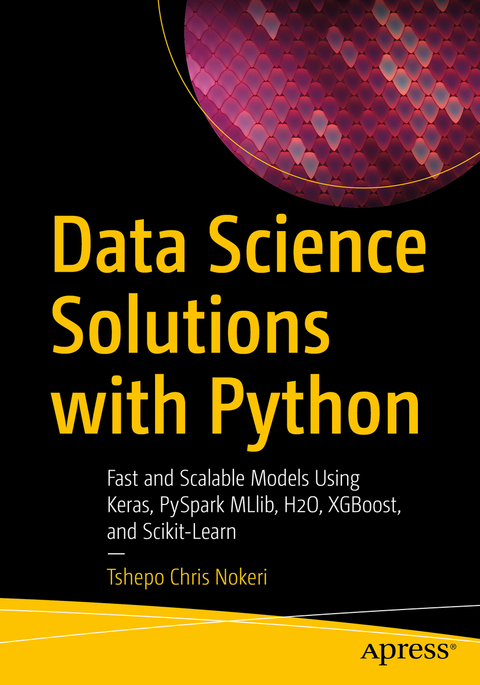
Data Science Solutions with Python
Apress (Verlag)
978-1-4842-7761-4 (ISBN)
The book covers an in-memory, distributed cluster computing framework known as PySpark, machine learning framework platforms known as scikit-learn, PySpark MLlib, H2O, and XGBoost, and a deep learning (DL) framework known as Keras.
The book starts off presenting supervised and unsupervised ML and DL models, and then it examines big data frameworks along with ML and DL frameworks. Author Tshepo Chris Nokeri considers a parametric model known as the Generalized Linear Model and a survival regression model known as the Cox Proportional Hazards model along with Accelerated Failure Time (AFT). Also presented is a binary classification model (logistic regression) and an ensemble model (Gradient Boosted Trees). The book introduces DL and an artificial neural network known as the Multilayer Perceptron (MLP) classifier. A way of performing cluster analysis using the K-Means model is covered. Dimension reduction techniques such as Principal Components Analysis and Linear Discriminant Analysis are explored. And automated machine learning is unpacked.
This book is for intermediate-level data scientists and machine learning engineers who want to learn how to apply key big data frameworks and ML and DL frameworks. You will need prior knowledge of the basics of statistics, Python programming, probability theories, and predictive analytics.
What You Will Learn
Understand widespread supervised and unsupervised learning, including key dimension reduction techniques
Know the big data analytics layers such as data visualization, advanced statistics, predictive analytics, machine learning, and deep learning
Integrate big data frameworks with a hybrid of machine learning frameworks and deep learning frameworks
Design, build, test, and validate skilled machine models and deep learning models
Optimize model performance using data transformation, regularization, outlier remedying, hyperparameter optimization, and data split ratio alteration
Who This Book Is For
Data scientists and machine learning engineers with basic knowledge and understanding of Python programming, probability theories, and predictive analytics
Tshepo Chris Nokeri harnesses advanced analytics and artificial intelligence to foster innovation and optimize business performance. In his functional work, he has delivered complex solutions to companies in the mining, petroleum, and manufacturing industries. He initially completed a bachelor’s degree in information management. Afterward, he graduated with an Honours degree in business science at the University of the Witwatersrand on a TATA Prestigious Scholarship and a Wits Postgraduate Merit Award. They unanimously awarded him the Oxford University Press Prize.
Chapter 1: Understanding Machine Learning and Deep Learning.- Chapter 2: Big Data Frameworks and ML and DL Frameworks.- Chapter 3: The Parametric Method – Linear Regression.- Chapter 4: Survival Regression Analysis.-Chapter 5:The Non-Parametric Method - Classification.- Chapter 6:Tree-based Modelling and Gradient Boosting.- Chapter 7: Artificial Neural Networks.- Chapter 8: Cluster Analysis using K-Means.- Chapter 9: Dimension Reduction – Principal Components Analysis.- Chapter 10: Automated Machine Learning.
“The book has a reader-centric style. Topics are covered briefly. … The book can be considered as an introduction to various topics. Code listings and graphical results for different models are added benefits, which could enhance learning and exposure.” (Jawwad Shamsi, Computing Reviews, June 29, 2022)
| Erscheinungsdatum | 29.10.2021 |
|---|---|
| Zusatzinfo | 35 Illustrations, black and white; XVI, 119 p. 35 illus. |
| Verlagsort | Berkley |
| Sprache | englisch |
| Maße | 178 x 254 mm |
| Themenwelt | Mathematik / Informatik ► Informatik ► Datenbanken |
| Mathematik / Informatik ► Informatik ► Programmiersprachen / -werkzeuge | |
| Informatik ► Theorie / Studium ► Künstliche Intelligenz / Robotik | |
| Mathematik / Informatik ► Mathematik ► Wahrscheinlichkeit / Kombinatorik | |
| Schlagworte | Big Data Analytics • Deep learning • H2O • Keras • machine learning • MLib • PySpark • Python • Python Frameworks • scikit-learn • xgboost |
| ISBN-10 | 1-4842-7761-9 / 1484277619 |
| ISBN-13 | 978-1-4842-7761-4 / 9781484277614 |
| Zustand | Neuware |
| Informationen gemäß Produktsicherheitsverordnung (GPSR) | |
| Haben Sie eine Frage zum Produkt? |
aus dem Bereich


